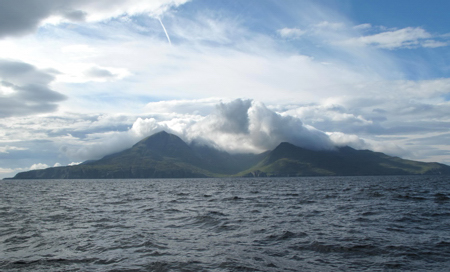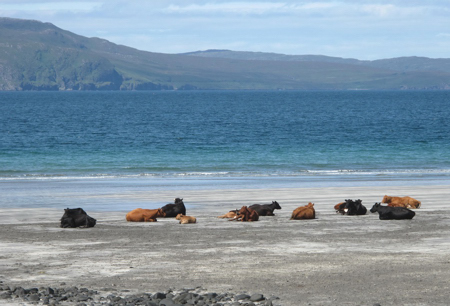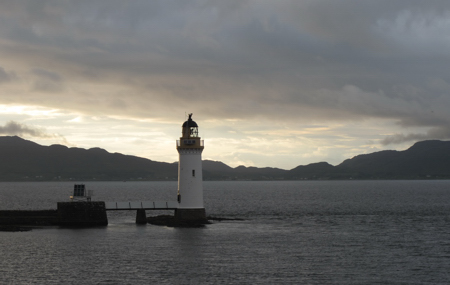By Jo.
Well, we are sat on anchor off Mingulay at the southern end of the Outer Hebrides, surrounded by Basking Sharks – not bad! I think it is fair to say that the SOTW has housed a new energy over the past week. A group of fifteen people, and their wonderfully eclectic passions, have been brought together by Cape Farewell, for the first in a series of four week long expeditions. We have been cruising the Scottish Western Isles, investigating the impact of climate change on the cultures and ecologies of Scotland’s island communities.
This first week has taken us from Oban, to Mull and then on to explore the Small Isles of Rhum and Eigg, before heading back to the main land via the mighty Scabaig Loch at the foot of the Black Cullin Mountains on Skye.
This week’s sailors, Gaelic poets, visual artists, social and physical scientists, if you can box these people under specific genres, have explored the islands to converse with islanders and visit the natural environments. The topics of community and place seem to have been threaded through the majority of conversations and works carried out on shore and aboard, in order to contemplate today’s balance between society and nature.
It has been incredibly inspiring to visit remote communities, whose work and lifestyles very obviously rely on a harmonious relationship with nature, and with each other. It is been interesting to see how this balance is achieved in such a variety of ways.
The first stop was Dunstaffnage to visit SAMS (Scottish Association for Marine Science), where we met with the Director, Professor Lawrence Mee. Professor Mee, has had a rich career in Marine Science, having spent several years working at the United Nations followed by Plymouth University’s Marine Science Department, before moving to SAMS. It was really interesting to hear how his focus is moving from physical oceanography, towards addressing the relationship between people and the sea – especially as I have just written a MSc dissertation on this exact topic. If we protect what we love – how do we learn to love what many people do not see or experience? We discussed the challenges of conserving an environment that lies masked in the deep blue. Very fittingly for the focus of Cape Farewell. As I walked back to the boat with Environmental Forensic, Antoine, and award winning writer and film maker Xialu, I realised the importance of the work being carried out on Song of the Whale this week, it is incredible to debate the topics, from such diverse viewpoints, that many of us work on in isolation.
Next stop, Tobermory, Mull. Trips ashore involved a visit to Mull Cheese, and the Arts Centre. The sun set on the first night was magical as a fairly deep low pressure system pushed a moody sky towards us. A few of us went beach combing, discovering the healing powers of local seaweed, and collecting items that were then turned into pieces of art aboard Song of the Whale.
Time on Rhum gave us a brief insight into a very small and fairly transient island community. The previous wealthy owner built a fairly odd looking mansion seemingly to throw big parties in – a great set for a vampire movie. Now, islanders are struggling with accommodation to house a community which wishes to expand, and together they are learning to slowly become more self-sufficient, yet are drastically restricted by funding and the lack of knowledge that comes with having so few people to share ideas with.

Eigg was our next island – and I was surprised we left after our stay with as many crew members as we arrived with. The energy from the land and the community were equally as powerful, and we could write pages on what we learnt from a brief period of time on the island. You might have heard of Eigg, which since it’s buy-out, has really proven to be an inspiring case study of a community who have worked hard to become self-sufficient. The island has about 85 residents and produces almost all its own power in a scheme which brings together wind, hydro and photovoltaic renewable resources to provide islanders with 24 hour reliable electricity. Electricity consumption on Eigg has been kept low through a combination of demand management and behavioural change. Renewable energy, home insulation, solar water heating, local food growing and waste management have also contributed to reducing carbon emissions. CO2 emissions per household are 20% lower than the UK average, and electricity use is 50% lower. Our visit was made particularly special as Lucy Conway, who lives on Eigg had spent the week on Song of the Whale. It was brilliant to be a part of sailing Lucy into her home harbour, and to receive such a warm and open welcome from her extended family. We used bikes to explore the island, visiting Crofts, Eigg Electric, farms, cows lazing on the beach and just generally sharing time with the people of Eigg and the peace and vitality of the land itself. On the first night of our stay we gathered together in the community hall for a ‘pot luck’. I felt very humbled to be asked to share the story of the Plastiki expedition with the community, as many of my inspirations when building the Plastiki and preparing for the voyage were drawn from communities such as Eigg. Incredibly some of the island watched us sail across the Pacific. Time on Eigg gave us all much food for thought, we stage expeditions, write scientific papers, produce art to discuss the balance between people and nature – yet the people on Eigg are visions of action. Every day they work on addressing the harmony between themselves, each other and the land and sea on which their survival is dependant. I really look forward to visiting Eigg again very soon, especially if the dancing at our final night Ceilidh is a regular occurrence – and Maggie’s Whisky pouring!

The dramatic scenery of Scabaig Loch, at the foot of the Black Cullin Mountains was the perfect next and final stop for the week. Giving us all some space to contemplate the hive of active thoughts scurrying around our minds after learning so much in such a short space of a week. Mat and I went on a ‘walk’ in search for a waterfall he had been to as child. Mat’s walk at the best of time is my slow jog – but he chose to run up the face of the mountain, in hot pursuit were Chef Oliver and artists / boat builder Tom. Awesome – standing at the top of such massive scenery really makes us feel so very small!
Friday came around far too quickly and it was time to say good bye to the community which has quickly established itself on SOTW. As sailors we are used to being a part of a transient community, in an environment where you do build great relationships quickly. However, SOTW really housed a special vibe this week; Ruth, who is leading the expedition, had brought together a group of people who seemed to magically create a very balanced, extremely fun community. Serious debates could have tipped in difference of opinion – but always resulted in laughter, and without a doubt expanded all of our thinking. This fact, mixed with the incredible scenery of the Scottish Isles, and the unique experiences we had all enjoyed ashore, has certainly resulted in one of those weeks that will still be in my thoughts as I sit on my chair as an old lady. It really has been an incredible week, so rich in lessons that address our connection with the environment – from which our survival is truly dependent upon.

Sorry, comments are closed for this post.